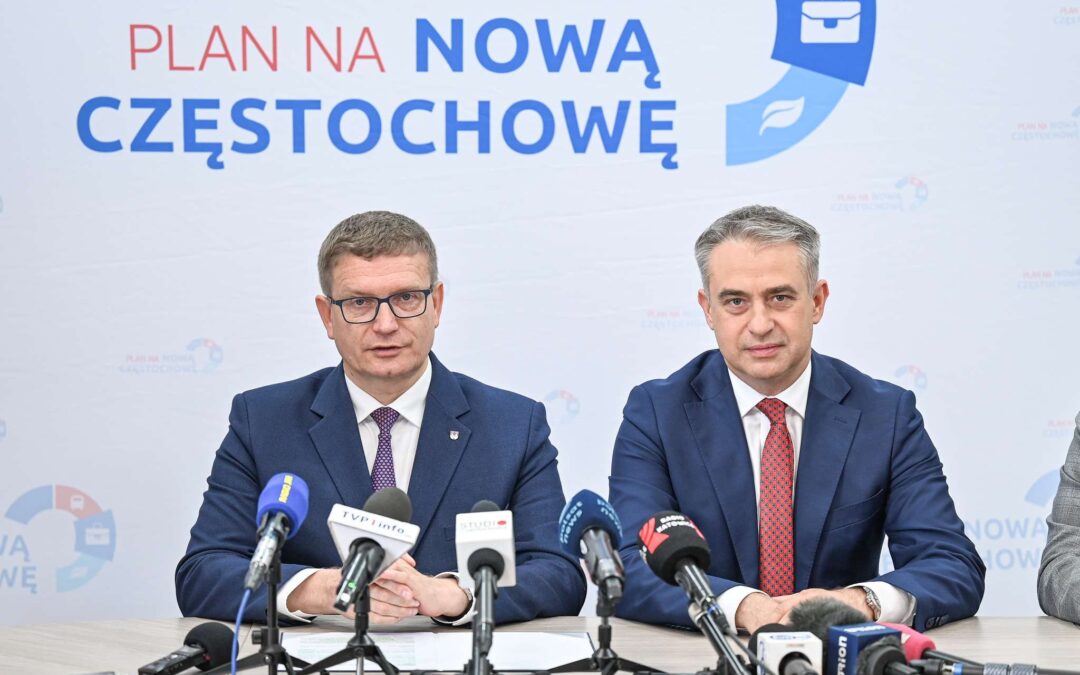Keep our news free from ads and paywalls by making a donation to support our work!

Notes from Poland is run by a small editorial team and is published by an independent, non-profit foundation that is funded through donations from our readers. We cannot do what we do without your support.
The city of Częstochowa will become the first in Poland to begin using the Polish Large Language Model (PLLuM), which was launched by the government earlier this year, to support the use of artificial intelligence (AI) in providing services to residents.
Under a pilot programme run with the digital affairs ministry, the city will use AI to enable faster writing of official letters, to analyse inquiries from residents, and to summarise long documents, among other tasks.
Częstochowa będzie testować PLLuM! 🇵🇱🤖
Wicepremier i minister cyfryzacji @KGawkowski oraz prezydent Częstochowy @MatyjaszczykK podpisali dziś list intencyjny, który rozpoczyna współpracę nad pilotażem polskiego modelu językowego @PLLuM_pl w administracji samorządowej.
Jak AI… pic.twitter.com/6bMl0ANji8
— Ministerstwo Cyfryzacji (@CYFRA_GOV_PL) August 8, 2025
“Thanks to PLLuM, it will be possible to automate many official tasks, improve communication with citizens, and simplify internal bureaucratic processes,” said digital affairs minister Krzysztof Gawkowski. That will “reduce the time needed to handle matters and make the entire process more transparent”.
But “PLLuM is not just about technology – it’s also an expression of Poland’s digital independence,” he added. “By using our own solutions, based on Polish data and developed by local experts, Poland avoids dependence on foreign AI providers. We are building solutions that meet our needs.”
Częstochowa’s mayor, Krzysztof Matyjaszczyk, said that the use of AI would “make life easier” for the city’s 200,000 residents and help “create new, modern jobs”. His city’s experiences during the pilot programme will also be used to help improve PLLuM.
PLLuM was launched last year as a freely available tool intended to support the development of AI in Poland, and in particular its use in providing public services. The digital affairs ministry announced that it would spend 19 million zloty (€4.5 million) on enabling its implementation in public administration.
Large language models (LLMs) are trained on vast amounts of data, enabling them to perform tasks such as text generation and translation. They are what power popular AI chatbots such as Open AI’s ChatGPT, Google’s Gemini and Elon Musk’s Grok.
On Friday, Gawkowski revealed that, by the end of this year, PLLuM would be integrated with Poland’s mObywatel system – which provides public information and services to citizens – where it will power a chatbot.
Poland’s government has launched a Polish Large Language Model (PLLuM) that is freely available and intended to support the development of AI.
In particular, it will be used to create virtual assistants intended to help provide public services https://t.co/z0gdWkM4OH
— Notes from Poland 🇵🇱 (@notesfrompoland) February 24, 2025
“Over the years, we’ve become accustomed to the fact that…it was difficult to handle certain matters because of a lack of officials, or because there were misunderstandings between departments,” said the minister.
“That is why the Polish state decided to invest in a new language model that will allow the administration to benefit from artificial intelligence,” he added.
Poland has the European Union’s second-lowest use of AI tools by companies, according to Eurostat data. The government has sought to address this by investing 1 billion zloty in the development of AI and establishing a “strategic partnership” with Google to develop AI.
Google has announced a "strategic partnership" with Poland to develop artificial intelligence.
Poland’s “leadership, ambitions and talents” have “given it a new position in European innovation”, says @Google CEO @sundarpichai https://t.co/ITXWemFZIR
— Notes from Poland 🇵🇱 (@notesfrompoland) February 13, 2025

Notes from Poland is run by a small editorial team and published by an independent, non-profit foundation that is funded through donations from our readers. We cannot do what we do without your support.
Main image credit: UM Częstochowa

Daniel Tilles is editor-in-chief of Notes from Poland. He has written on Polish affairs for a wide range of publications, including Foreign Policy, POLITICO Europe, EUobserver and Dziennik Gazeta Prawna.



















